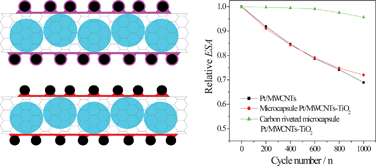Pt/MWCNTs (Multi-walled carbon nanotubes, MWCNTs) and microcapsule Pt/MWCNTs-TiO2catalysts have been prepared by microwave-assisted polyol process (MAPP). Electrochemical results show that microcapsule Pt/MWCNTs-TiO2catalyst has higher activity and stability than Pt/MWCNTs due to more uniform dispersion and smaller size of Pt nanoparticles. Furthermore, carbon riveted microcapsule Pt/MWCNTs-TiO2catalyst has been designed and synthesized on the basis of in situ carbonization of glucose. The physical characteristics such as XRD, TEM, HRTEM, STEM, and XPS have indicated that the anatase TiO2 indeed entered the inside of the MWCNTs and formed the microcapsule support of MWCNTs with TiO2. The accelerated potential cycling tests (APCT) indicate that the carbon riveted microcapsule Pt/MWCNTs-TiO2catalyst with similar activity to microcapsule Pt/MWCNTs-TiO2 and Pt/C possesses 7.5-times as high stability as that of Pt/C and has 3-times as long life-span as that of carbon riveted Pt/TiO2-C reported in our previous work. The significantly enhanced stability for carbon riveted microcapsule Pt/MWCNTs-TiO2catalyst is assignable to: (1) the inherently excellent mechanical resistance and stability of anatase TiO2 and MWCNTs in acidic and oxidative environments; (2) strong metal-support interaction between Pt nanoparticles and the microcapsule support; (3) the anchoring effect of the carbon layers formed during the carbon riveting process.

